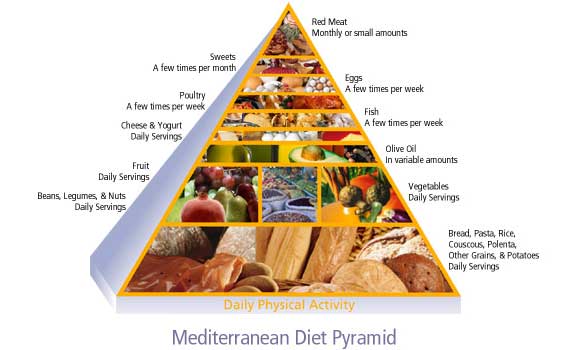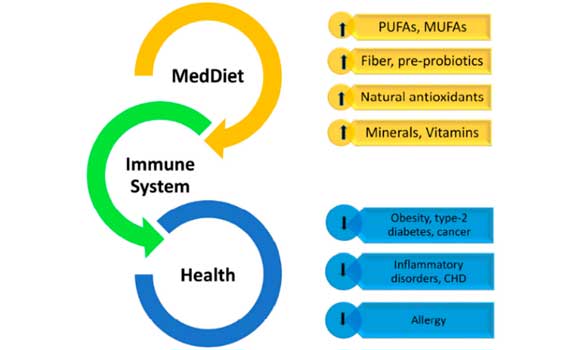Mediterranean Diet

Mediterranean diet refers to the traditional cuisine and eating habits of the people living in countries around the Mediterranean Sea. Mainly Greece, Spain, Crete, Portugal, Malta, and Cyprus and south of France and Italy. As a matter of fact, people living in these countries have shown to have fewer ailments such as diabetes and obesity and excellent cardiovascular health. However, this is achieved due to an active lifestyle and a diet that contains natural products and eliminates processed food and high saturated fat and meats.
What is the usefulness of the Mediterranean Diet in today’s age?
In today’s age of readily available fast and processed food and a sedentary lifestyle that easily leads to obesity and other lifestyle diseases such as diabetes and heart diseases. Many people are turning to the time-honored eating patterns of folks living in the Mediterranean region. Moreover, the interest in the Mediterranean lifestyle and food habits started in America in the 1950s. Many researchers found that Mediterranean people have lower levels of cholesterol and fewer chances of coronary heart diseases. With more research, it was found that the Mediterranean diet is the best diet for heart patients. However, the foods people eat show a reduced risk for cardiovascular disease.
What The Dietary Guidelines for Americans says:
The Dietary Guidelines for Americans released by the American Society on Nutrition recognized the Mediterranean diet as one of the healthiest diets that help with obesity and cardiovascular diseases. Moreover, the World Health Organization recognized it, for being one of the healthiest eating patterns in the world and an intangible cultural heritage asset by the United National Educational, Scientific and Cultural Organization.
Oldways, a nonprofit food and lifestyle organization from Boston in collaboration with the Harvard School of Public Health and World Health Organization in 1993, developed a Mediterranean diet pyramid that makes it easy to figure out what foods to eat and what foods to avoid in the Mediterranean diet. One should avoid these pyramid details in a Mediterranean diet.
Mediterranean diet food pyramid :

- The main foods that you must include in your everyday diet: whole grains, fresh fruits, and vegetables, legumes, beans and pulses, spices such as garlic and basil, nuts such as almonds and walnuts, starchy foods such as bread, potatoes, rice and pasta and the only oil to cook them in must be plant and vegetable-based, preferably olive oil.
- Fish, shellfish, and other seafood are the main ingredient of cuisine in the Mediterranean region. Fishing and seafood harvesting is one of the main sources of revenue in the Mediterranean region. You should eat fish and seafood several times a week.
- Moreover, dairy products, eggs, cheese, processed meats, and poultry must be eaten occasionally
- One should limit the intake of red meats, saturated fats, and refined sweets.
Where to start?
Since the Mediterranean eating pattern cannot be constituted in a single uniform diet, the diets of people in the many countries bordering the Mediterranean Sea are slightly different. However, they all do follow the traditional food habits of their predecessors, include plenty of fresh produce in your diets such as fruits and vegetables and eat fish at least twice a week. One should avoid foods such as red meat, refined sugar, and saturated fats. You can consult the Mediterranean food pyramid formulated by Oldways to construct your diet the Mediterranean way.
The popularity of wines in the Mediterranean region:
Wines are very popular in Mediterranean countries and a staple in the Mediterranean diet. People consume red wine in this region. Moreover, doctors recommend a glass of red wine once in a day, especially during dinner. Stimulants such as coffee and tea may also come handy. Although these are not as popular in the Mediterranean region as wine, people must be consumed without any excessive sugar or milk.
The concept behind this diet:
However, the central concept behind the Mediterranean way of eating is to consume fresh and vegetarian products. The Mediterranean diet excludes anything that is animal-based, except seafood. Fishing and seafood trade is a good source of revenue and a staple in their diets.
Things to avoid in the diet?
One should also avoid the intake of animal-based meats such as poultry and red meats such as sausages and hotdogs. Refined sugar and grains such as white bread and highly saturated and trans fats that are present in processed food. One should also avoid the intake of refined oils as well and the only plant-based and vegetable-based oils.
Mediterranean diet health benefits :
Benefits to heart

Many doctors consider a diet rich in Mediterranean food and health practitioners to be the best diet for heart patients. Almost every food group included in this diet is good for the overall health of your heart and avoids cardiovascular diseases and heart attacks. Good fats such as Olive oil and nuts help keep your cholesterol low and regulated. Fresh Fruits and vegetables lend a purifying effect to your body and keep your arteries clear. Moreover, fish helps lower triglycerides and blood pressure. Even a daily glass of red wine may be good for your heart. Even doctors recommend to take daily, once a day for women and twice a day for men.
It will be filling
Since this diet is rich with fiber and healthy fats, it will keep you full for a longer time. Thus, the Mediterranean diet focuses mainly on satiety, which is the feeling of fullness when you eat food. Since you’ll be eating lots of fiber-rich whole food and whole grains, and cooking with good fats like olive oil, this diet will keep feeling very filling. Therefore, you won’t feel hungry for many hours.
Mediterranean diet for weight loss
The Mediterranean diet may be very beneficial for people who want to slim down. It contains good fats and satiating food that will help you feel full for a long time. However, it also encourages the intake of more vegetables and fruits and less refined and processed food that makes weight loss easier.



